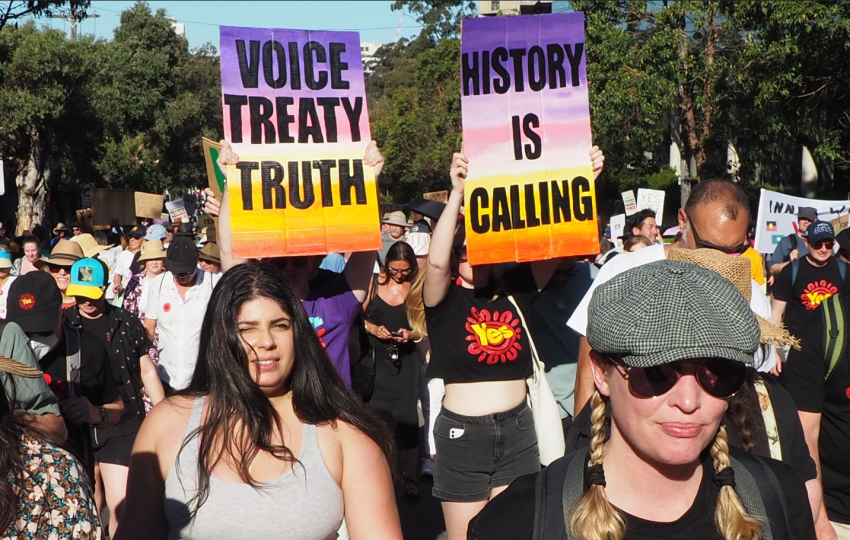
Most First Nations people have felt the result of the Voice referendum as a slap in the face.
An extremely modest proposal for token constitutional recognition and a First Nations advisory body was voted down in every state and territory, except the ACT.
However, nearly all previous constitutional referendums have failed and the result of this referendum was predicted by all the polls in the lead-up to October 14. The result should not have been a surprise.
The polls also showed that the Yes campaign started up with close to 60% of the vote, but steadily fell to less than 40%, demonstrating that the Yes side lost ground over the course of the campaign.
The conservative No campaign played to fear, ignorance and entrenched racism from the start. The steady decline of support for Yes, despite a multi-million dollar campaign from many of the largest corporations, cannot be entirely explained by the conservative No campaign, racist and dishonest as it was.
The Yes campaign was deeply flawed from the start.
It was designed to be minimalist and conservative in the hope of getting bipartisan support, which it failed to get. Consequently, its arguments were contradictory and its promises did not match its proposals.
It purported that token constitutional recognition (already inserted into every state constitution) and the establishment of a First Nation’s advisory body would somehow close the yawning gap.
The Yes campaign could not even tell the truth about the differences between First Nations peoples. There was no hiding the fact that most of the most militant and grassroots-mobilising First Nations activists argued for a progressive No vote, based on demands for sovereignty, truth telling, treaties and rights-based measures to close the gap between First Nations communities and the rest of the population.
The Yes campaign insisted that the referendum proposal had the unanimous support of First Nations people when, in fact, it was devised by a small number of conservative, bureaucratic First Nations leaders in consultation with conservative political and corporate elites.
Revealingly, Noel Pearson, a leader of the Yes campaign, told the elite King’s School in Gadi/Sydney, just before referendum day: “Frankly, the voice is a proposal so pathetically understated that I’m amazed most Indigenous people are settling for it. After all, I helped design it as something so modest that no reasonable non-Indigenous Australian could reject it. More fool me.”
Pearson admitted that he had devised the proposal in discussion with former PM John Howard and spent all his energy trying to win the support of conservatives.
Until recently, Pearson was the darling of the right. Pearson, a lawyer, became famous for attacking “the left” for allegedly “inculcating a sense of victimhood” in First Nations people and making them dependent on welfare. Not surprisingly, he was feted and given platforms and funds by the right and their media empires.
Pearson has now been supplanted by Jacinta Price and Warren Mundine as the right’s Indigenous poster people.
The Liberal and National Party leaderships ditched the bipartisan deal on the Voice referendum before the date was announced, but the Yes campaign rolled on with the same minimalist proposal.
First Nations people are right to feel like they have been kicked around like a political football by the major parties and the corporate interests they loyally serve.
Liberal leader Peter Dutton’s naked appeal to racism was despicable, but Labor’s decision to proceed with a campaign that was tailored to succeeding only with bipartisan support deserves deeper scrutiny.
Internal Labor party polling must have shown that the referendum would fail, yet Labor persisted with it, ostensibly as costly “proof” that Prime Minister Anthony Albanese “keeps his election promises”.
Albanese also promised to implement the Statement From The Heart agenda in full; we will see if his government now proceeds with Treaty and Truth-telling.
However, his government does not deserve the confidence of First Nations people because, even as it was promising to close the gap, his own ministers were supporting mining company interests against the objections of local First Nations communities.
During the Voice campaign, the Queensland Labor government legalised the incarceration of (mainly Indigenous) youth in adult lock-ups and the Western Australian Labor government back-flipped on Indigenous heritage protection laws it made after Rio Tinto legally destroyed the 46,000-year-old Juukan Gorge rock shelters.
The sadness and anger in First Nations communities after the referendum, which in large majority voted Yes, is understandable and deserves respect.
But as First Nations Senator Lidia Thorpe said after the referendum, the movement needs to look forward.
“To all the grassroots mob, activists, and allies who have built up networks, Yes or No, in the name of advancing the rights of First Peoples: We must look beyond the division that the referendum has caused and come together to demand the justice necessary to rebuild, and nurture the strength and power of our communities.
“Do not let this be the last time you engage with our struggle. Pour your time, energy and passion into understanding our history and Lore, amplifying our voices and standing with our grassroots communities.
“We must continue to pressure the federal government to begin Treaty-making, implement the [United Nations] Declaration on the Rights of Indigenous people and implement in full the recommendations of the Royal Commission into Aboriginal Deaths in Custody and the Bringing Them Home report that have been ignored for decades.”
The referendum results had a silver lining: they revealed significant minority support for the ongoing struggle for First Nations rights especially among younger people.
Conservative ideas dominate most of the time under capitalism, because the ruling class has ample means to keep people depoliticised, confused and divided.
However, minorities can swiftly turn into majorities, especially if they are on the right side of history.
“Don’t agonise, organise!” should be our catch cry.